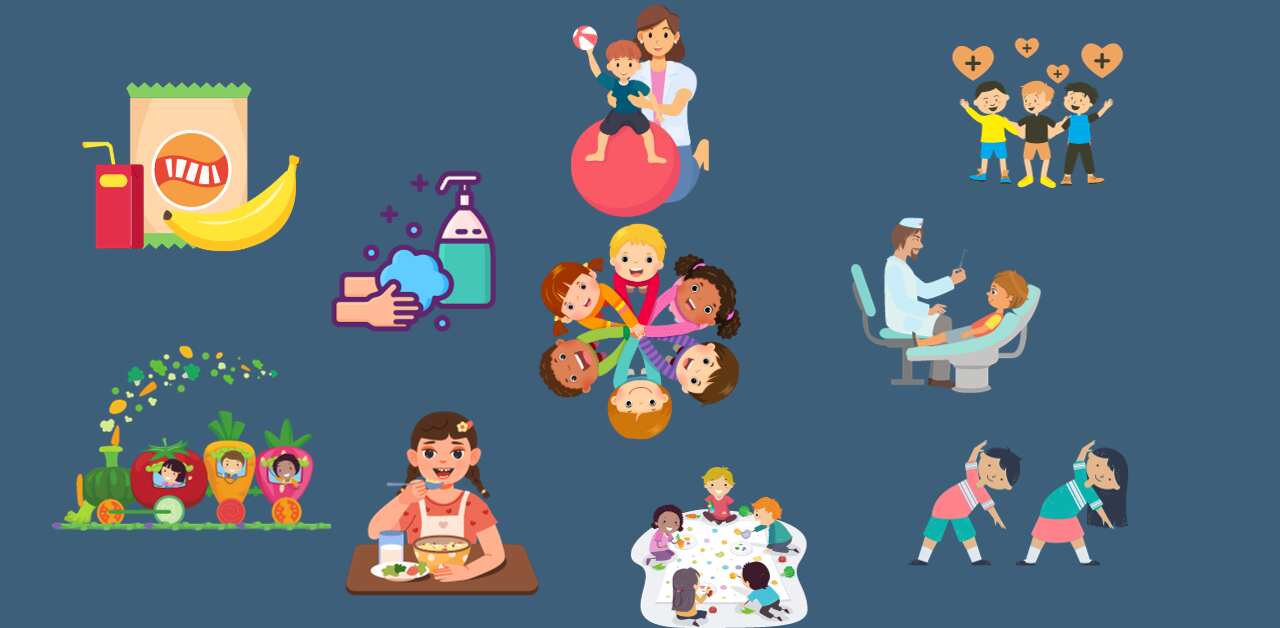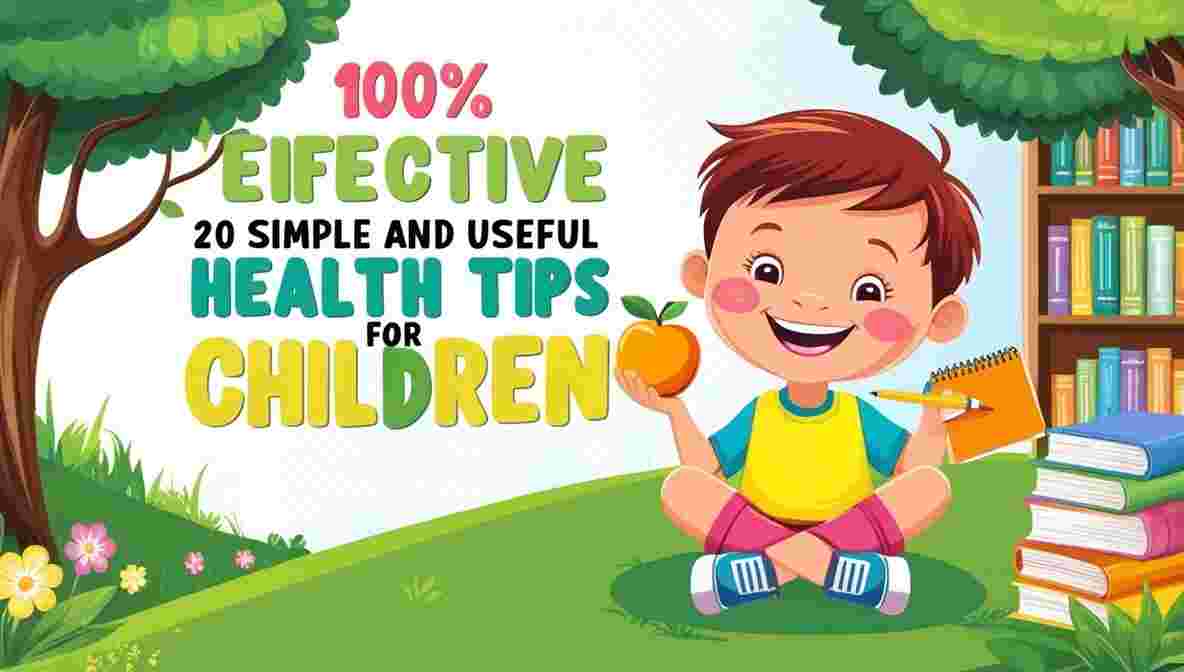100% effective 20 Simple and Useful Health Tips for Children
In today’s fast-paced world, ensuring the health and well-being of our children is paramount. From maintaining a balanced diet to encouraging regular physical activity, instilling healthy habits early on sets the foundation for a lifetime of wellness. Here are 20 simple yet effective health tips to promote the optimal health of children:

100% Effective 20 simple and useful health tips for children are given below.
1. Encourage Regular Exercise: Encourage children to engage in at least 60 minutes of physical activity daily to promote cardiovascular health, muscle strength, and overall well-being.
2. Prioritize Sleep: Ensure children get adequate sleep each night, as proper rest is essential for growth, cognitive function, and immune health.
3. Limit Screen Time: Set limits on screen time for TVs, computers, and smartphones to promote healthy eyesight and prevent sedentary behavior.
4. Promote Hydration: Encourage children to drink plenty of water throughout the day to stay hydrated and support optimal bodily functions.
5. Maintain a balanced diet: Provide a variety of nutritious foods, including fruits, vegetables, whole grains, lean proteins, and dairy, to support growth and development.
6. Limit sugary drinks and snacks: Minimize the consumption of sugary drinks and snacks to prevent dental issues, weight gain, and other health concerns.
7. Encourage Breakfast: Ensure children start their day with a nutritious breakfast to fuel their bodies and support concentration and learning.
8. Practice good dental hygiene: Teach children the importance of brushing and flossing their teeth regularly to maintain oral health and prevent cavities.
9. Foster Emotional Well-being: Create a supportive environment that encourages open communication, emotional expression, and positive coping strategies.
10. Teach Handwashing: Emphasize the importance of handwashing with soap and water to prevent the spread of germs and reduce the risk of infections.
11. Promote Sun Safety: Teach children to apply sunscreen and wear protective clothing when outdoors to prevent sunburn and reduce the risk of skin cancer.
12. Schedule regular check-ups: Ensure children receive regular check-ups with healthcare providers to monitor growth, development, and overall health.
13. Foster healthy relationships: Encourage positive social interactions and teach children to build healthy relationships based on mutual respect and communication.
14. Set a Positive Example: Lead by example by demonstrating healthy habits, such as exercising regularly, eating nutritious foods, and managing stress effectively.
15. Provide mental stimulation: Engage children in activities that stimulate their minds, such as reading, puzzles, and creative projects, to support cognitive development.
16. Practice Safety Measures: Teach children about safety measures, such as wearing helmets when biking, using seat belts in cars, and crossing the street safely.
17. Limit Exposure to Toxins: minimize children’s exposure to environmental toxins, such as cigarette smoke, pollution, and harmful chemicals, to protect their health.
18. Encourage Outdoor Play: Encourage outdoor play and exploration to promote physical activity, creativity, and appreciation for nature.
19. Monitor Screen Content: Monitor the content children are exposed to on screens to ensure it is age-appropriate and promotes positive values and behaviors.
20. Celebrate Achievements: acknowledge and celebrate children’s accomplishments, both big and small, to boost self-esteem and foster a positive sense of self-worth.
By incorporating these simple yet effective health tips into daily routines, parents and caregivers can empower children to lead healthy, happy, and fulfilling lives.
Question and answer of 100% Effective 20 Simple and Useful Health Tips for Children
Question: Why are daily exercise and physical activity important for children’s health?
Answer: Daily exercise and physical activity are important for children’s health because they help develop strong muscles and bones, maintain a healthy weight, improve cardiovascular fitness, and promote overall well-being.
Question: How can I limit screen time and encourage more outdoor play for my child?
Answer: Screen time can be limited by setting time restrictions on electronic devices. Encouraging outdoor play includes providing opportunities for activities such as sports, playing in parks, and exploring nature.
Question: What is a balanced diet for children, and why is it important?
Answer: A balanced diet for children includes a variety of foods, with an emphasis on fruits and vegetables. It is essential to provide essential nutrients for growth, energy, and overall health.
Question: How much sleep should my child get each night?
Answer: The recommended amount of sleep for children varies by age. It’s generally recommended that preschoolers get 10–13 hours of sleep. School-age children get 9–11 hours, and teens get 8–10 hours of sleep each night.
Question: Why is good hygiene important for children?
Answer: Good hygiene is important to prevent the spread of diseases and maintain overall health. For example, washing hands regularly helps reduce the risk of infection.
Question: How often should my child visit the dentist?
Answer: Regular dental checkups every six months are usually recommended to ensure good oral health. These visits also help promote dental hygiene and prevent dental problems.
Question: What are the benefits of wearing protective gear during sports?
Answer: Wearing protective gear during sports helps prevent injuries and ensure the safety of children while engaging in physical activities.
Question: Why is sun protection important for children?
Answer: Sun protection is important to prevent sunburn and reduce the risk of skin cancer. Wearing sunglasses can also protect the child’s eyes from harmful UV radiation.
Question: Why is it important to model healthy behavior as a parent?
Answer: Modeling healthy behavior sets a positive example for children and encourages them to adopt healthy habits.
Question: How can I help my child socialize and make friends?
Answer: You can help your child socialize by organizing play dates. Enrolling them in group activities or games, and teaching them social skills like sharing and empathy.
Conclusion
Children’s well-being is extremely important. And it is our responsibility as parents and caregivers to ensure that they lead healthy lives. The 20 simple yet highly effective health tips given in this article provide a holistic approach to safeguarding your child’s well-being. By implementing these tips, you can contribute to your child’s physical, mental, and emotional health, setting them on a path to a brighter and healthier future.
